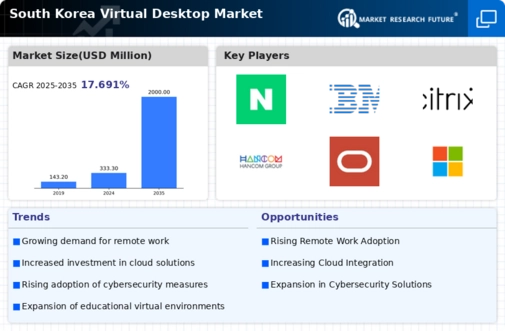The South Korea Virtual Desktop Market is one of the top performers in the world with immense potential due to various reason. One of them is the validity in the market for VDI solutions due to Remote Work Culture fostered by the COVID-19 pandemic. A number of organizations in South Korea now use a hybrid and remote working model which increases the demand for virtual desktop infrastructure (VDI) so that employees can access applications and data from anywhere.
This transformation is further enhanced by government policies aimed at the promotion of digital transformation and development of smart workplaces which increases the adoption of virtual desktop solutions. South Korea presents great prospects in the Virtual Desktop Market especially for advanced VDI developers that can design industry specific VDI solutions.
As businesses become more careful with data protection, there is an increasing attention on improving cybersecurity in virtual settings. Startups and established vendors that are willing to apply new technologies such as AI and machine learning to improve VDI management might have a unique opportunity to capture significant market share. Recently, there is strong movement towards integration with cloud services. South Korean firms are adopting cloud-based virtual desktops at a greater rate as they pursue scalability and flexibility.
Additionally, the development of 5G technology is changing the market by providing quicker and more stable connections, making the use of virtual desktops easy and pleasant for users.
Generally, the Virtual Desktop Market in South Korea is becoming more sophisticated as companies are eager to adopt the most innovative technological changes and responsive to new modes of working, all while ensuring optimal security.
Source: Secondary Research, Primary Research, MRFR Database, and Analyst Review
South Korea Virtual Desktop Market Drivers
Rapid Digital Transformation in Enterprises
The push for digital transformation among South Korean businesses is a primary driver of the South Korea Virtual Desktop Market Industry. According to a survey conducted by the South Korean Ministry of Science and ICT, about 85% of enterprises in South Korea are increasing their investments in digital technologies to enhance productivity and streamline operations. This trend signifies a robust shift away from traditional IT infrastructure towards cloud-based solutions, which encompass virtual desktops.
Companies like Samsung and LG are leading this initiative as they adopt virtual desktop solutions to facilitate remote work and improve employee collaboration. The strong government support for digital economy initiatives, including policies aimed to improve information technology (IT) infrastructure, has led to an influx of investments into virtual desktop infrastructure, making it a vital component of the modern workplace in South Korea.
Increasing Demand for Remote Work Solutions
Companies such as Naver and Kakao have successfully implemented virtual desktop environments, allowing their employees to work from home effectively. As hybrid work models are likely to remain prevalent, the demand for virtual desktops is expected to grow significantly in the coming years.
Government Initiatives and Support for Cloud Computing
The South Korean government has been proactive in promoting advanced technologies like cloud computing and virtual desktops. Initiatives under the 'Digital New Deal' provide financial support to enterprises that invest in cloud technologies. The government aims to increase the country’s competitiveness in the global market by enhancing cloud infrastructure, which inherently supports the growth of the South Korea Virtual Desktop Market Industry.
Data from the Ministry of Science and ICT reveals that the government has allocated substantial fundsabout 2 trillion Korean Won (approximately USD 1.7 billion) in the past year alonetowards fostering improvements in digital infrastructure.This endorsement positions virtual desktops as a critical component of the National Strategy for ICT development, further positively impacting market growth.


















